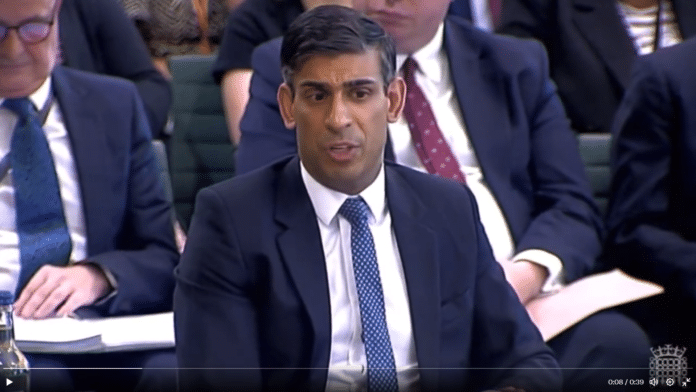He is as bad as Johnson. The difference is that he is not blonde and obese.
Listen to these clips and tell me he is better than that lying blonde haired puff adder that preceded the other blonde haired puff adder that preceded Sunak.
Sunak lying about the report from the Privileges Committee:
???? | BREAKING: Chris Bryant slams Rishi Sunak over the Privileges Committee report
— Politics UK (@PolitlcsUK) July 4, 2023
Bryant: "Do you think the MPs should apologise?"
Sunak: "I haven't gone through the report yet"
B: "You haven't… read the report?"
S: "Not from cover to cover"
B: "It's 3 pages long…" pic.twitter.com/WgNu4dtsEi
Sunak lying about the Commons vote on Johnson
"You didn't turn up for Owen Paterson votes…you didn't turn up for the Boris Johnson votes at all,
— PoliticsJOE (@PoliticsJOE_UK) July 4, 2023
"You chose not to be in Parliament. But yesterday you opined on the rules of cricket."
Chris Bryant lambasts the Prime Minister for failing on his duties to Parliament. pic.twitter.com/6NHUd1zjaB
Sunak lying about the continuing trade… with Russia
Chris Bryant: “Do you think British companies should be trading in Russia at all?”
— David (@Zero_4) July 4, 2023
Sunak: “Some might be divesting”
CB: “Mantrac, which owns Unatrac FZE, sold diggers to Russia this year and you took £5m from its owner…”
RS: “I’m not familiar with the specific company” pic.twitter.com/KvFgYvqKFa
Did you know that Churchill’s government allowed Britain to continue trading with the Nazis during World War 2?
The Second World War represented a pivotal moment in history, as the forces of democracy clashed with the expansionist ambitions of Nazi Germany. Amidst the raging conflict and atrocities committed by the Nazis, an uncomfortable reality emerges: the West continued to engage in economic trade with the enemy.
Here are some reasons why:
- Economic Considerations: Despite the ongoing war and the geopolitical tensions surrounding it, economic interests played a significant role in the West’s decision to continue trading with Nazi Germany. Several Western countries, including Britain, the United States, and Switzerland, recognised the economic benefits that could be derived from such trade. German demands for raw materials, such as oil, rubber, and metals, created lucrative opportunities for Western exporters. Furthermore, Nazi Germany’s robust industrial capabilities and skilled workforce made it an appealing market for Western goods. Economic considerations, driven by the desire to bolster national economies, led to a pragmatic approach to trade.
- Strategic Calculations: Political expediency also influenced the West’s decision to maintain economic relations with Nazi Germany during the war. Some Western leaders perceived Hitler’s regime as a counterbalance to the Soviet Union, fearing the spread of communism. By engaging with Nazi Germany economically, Western nations believed they could influence German policy and potentially curb Hitler’s aggression. This strategic calculus led to a willingness to overlook moral concerns in favour of geopolitical objectives.
- Limited Awareness: During the early years of the war, comprehensive knowledge of the extent of Nazi atrocities and the genocidal nature of Hitler’s regime was not widely available. The full horrors of the Holocaust were not yet exposed, and the information available to Western nations was often fragmentary and overshadowed by the immediate demands of war. As a result, many leaders and policymakers had limited awareness of the scale of Nazi crimes and, therefore, lacked a complete understanding of the moral implications of their economic engagements.
- Moral Dilemmas: The decision to trade with Nazi Germany placed Western nations in significant moral dilemmas. While economic benefits were emphasised, the moral costs of supporting a regime espousing hateful ideologies and committing atrocities were often overlooked or downplayed. The plight of persecuted groups, particularly the Jews, received insufficient attention, with economic considerations prevailing over ethical concerns. This disregard for human rights and complicity in the face of Nazi aggression remains a dark chapter in the history of Western nations.
- Resistance Efforts: It is important to note that despite the continuation of economic trade, there were notable instances of resistance against Nazi Germany within the Western countries. Underground networks, such as the French Resistance and intelligence organisations like the British Special Operations Executive, actively worked to gather intelligence, sabotage German operations, and support the Allied cause. These resistance efforts demonstrate that not all Western nations were complicit and that there were individuals and groups dedicated to undermining the Nazi regime.
The West’s decision to continue trading with Nazi Germany during World War II represents a complex and controversial aspect of history. Economic interests, strategic calculations, limited awareness, and moral dilemmas all played a role in shaping the West’s engagement with the enemy. However, this trade came at a great cost in terms of moral compromise and delayed recognition of the gravity of Nazi atrocities. It is crucial to critically examine and understand this historical context, acknowledging the moral failings of the past, in order to learn from history and ensure that similar compromises are not made in the face of future conflicts.
If only Mr Sunak and his predecessors took the time to learn from history instead of filling their pockets and looking after their mates.
Sunak bullshitting over and over
Chris Bryant – The ministerial code says… the most important government announcements should be made in Parliament… so why did you announce the NHS workforce plan not in Parliament?
— Haggis_UK ???????? ???????? (@Haggis_UK) July 4, 2023
Rishi Sunak – I've always tried to announce what I can in Parliament… ???? pic.twitter.com/e6jLfsai4j
What a nasty sociopath Sunak is.
Is anyone really surprised though?
Join us in helping to bring reality and decency back by SUBSCRIBING to our Youtube channel: https://www.youtube.com/channel/UCQ1Ll1ylCg8U19AhNl-NoTg and SUPPORTING US where you can: Award Winning Independent Citizen Media Needs Your Help. PLEASE SUPPORT US FOR JUST £2 A MONTH https://dorseteye.com/donate/







